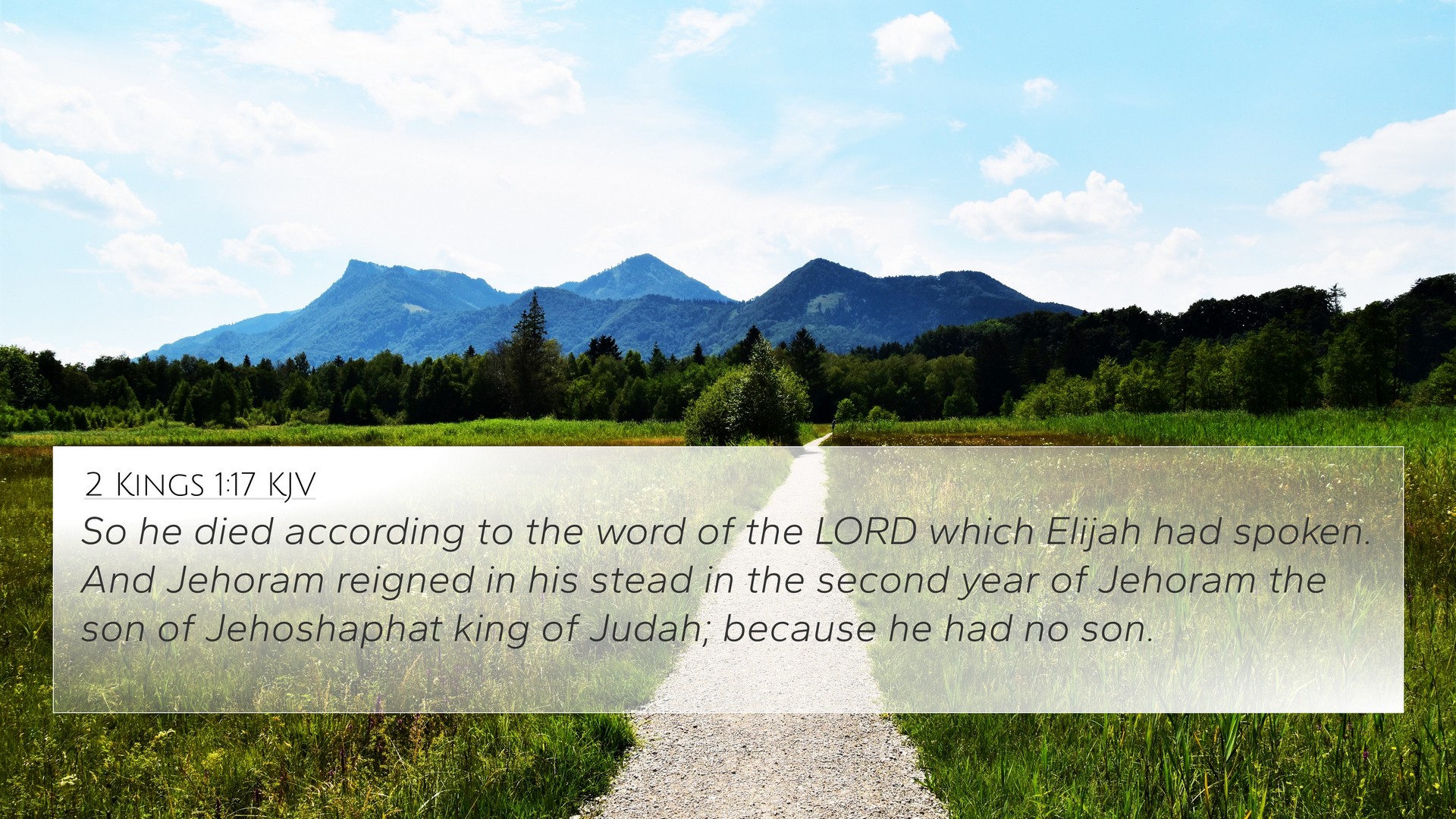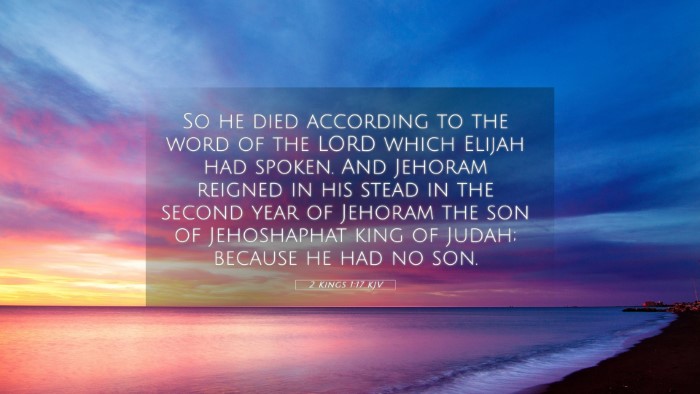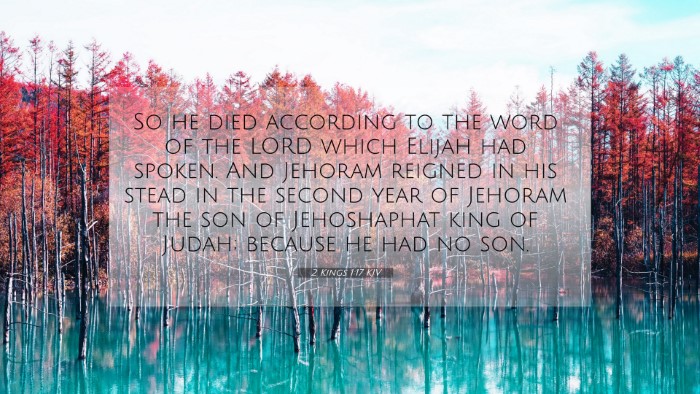Old Testament
Genesis Exodus Leviticus Numbers Deuteronomy Joshua Judges Ruth 1 Samuel 2 Samuel 1 Kings 2 Kings 1 Chronicles 2 Chronicles Ezra Nehemiah Esther Job Psalms Proverbs Ecclesiastes Song of Solomon Isaiah Jeremiah Lamentations Ezekiel Daniel Hosea Joel Amos Obadiah Jonah Micah Nahum Habakkuk Zephaniah Haggai Zechariah Malachi2 Kings 1:17 Similar Verses
2 Kings 1:17 Cross References
So he died according to the word of the LORD which Elijah had spoken. And Jehoram reigned in his stead in the second year of Jehoram the son of Jehoshaphat king of Judah; because he had no son.
Uncover the Rich Themes and Topics of This Bible Verse
Listed below are the Bible themes associated with 2 Kings 1:17. We invite you to explore each theme to gain deeper insights into the Scriptures.
2 Kings 1:17 Cross Reference Verses
This section features a detailed cross-reference designed to enrich your understanding of the Scriptures. Below, you will find carefully selected verses that echo the themes and teachings related to 2 Kings 1:17 KJV. Click on any image to explore detailed analyses of related Bible verses and uncover deeper theological insights.
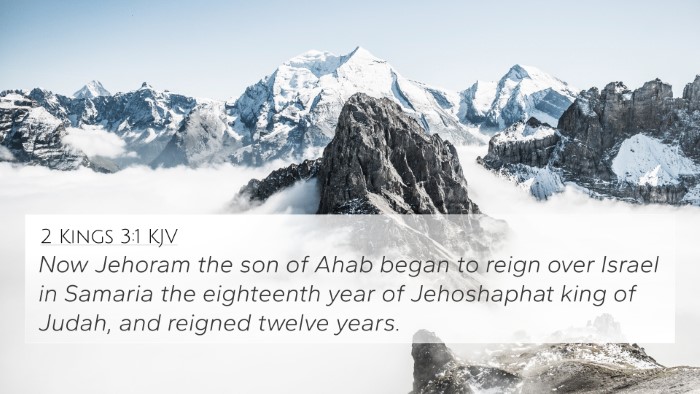
2 Kings 3:1 (KJV) »
Now Jehoram the son of Ahab began to reign over Israel in Samaria the eighteenth year of Jehoshaphat king of Judah, and reigned twelve years.
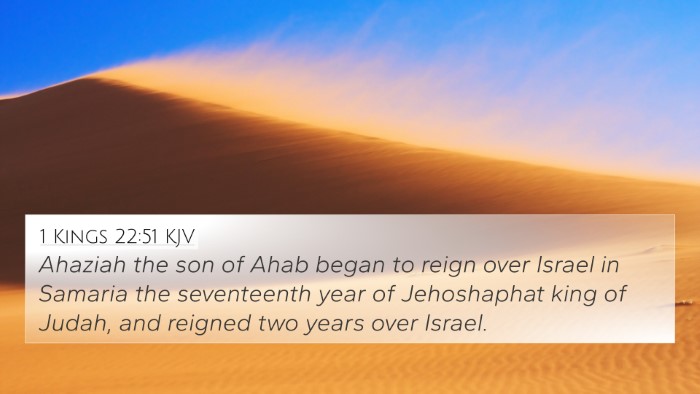
1 Kings 22:51 (KJV) »
Ahaziah the son of Ahab began to reign over Israel in Samaria the seventeenth year of Jehoshaphat king of Judah, and reigned two years over Israel.
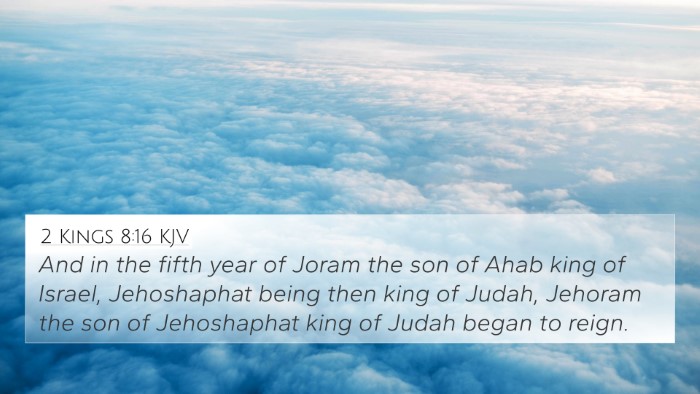
2 Kings 8:16 (KJV) »
And in the fifth year of Joram the son of Ahab king of Israel, Jehoshaphat being then king of Judah, Jehoram the son of Jehoshaphat king of Judah began to reign.
2 Kings 1:17 Verse Analysis and Similar Verses
Understanding 2 Kings 1:17
2 Kings 1:17 states: "So Ahaziah died according to the word of the Lord which Elijah had spoken. And because he had no son, Jehoram became king in his place, in the second year of the reign of Jehoram the son of Jehoshaphat, king of Judah." This passage marks a significant transition in Israel's monarchy and divine communication through prophets.
Historical Context
Ahaziah, the son of Ahab, ruled Israel but led the nation into sin, and his reign featured conflict with the prophet Elijah. The verse emphasizes the fulfillment of God’s prophecy regarding Ahaziah's death, showcasing the sovereignty of God's word.
Thematic Analysis
- Divine Judgment: Ahaziah's demise serves as a testimony to the consequences of straying from God’s commandments.
- Prophetic Authority: Elijah’s prophetic word highlights the imperative role of prophets as God’s spokespersons.
- Succession of Kings: The transition of power to Jehoram illustrates the continuity of leadership in Israel, even amid divine judgment.
Cross-References
Several Bible verses offer deeper insights into the themes of 2 Kings 1:17. Here are some notable cross-references:
- 1 Kings 16:30-33 - Details the wickedness of Ahab and his family.
- 1 Kings 19:1-4 - Recounts the conflict between Elijah and the House of Ahab.
- 2 Kings 1:4 - Discusses the prophecy of Ahaziah's death.
- 2 Kings 8:16-19 - Talks about Jehoram’s rise and its implications for the kingdom of Judah.
- Isaiah 14:28-32 - Prophetic implications for Israel’s leadership.
- Hebrews 1:1-2 - Highlights God speaking through prophets, connecting to Elijah’s role.
- Malachi 4:5-6 - Foretells the coming of Elijah before the great day of the Lord.
Insights from Commentaries
Various public domain commentaries enrich the understanding of this verse:
-
Matthew Henry:
Henry emphasizes the element of divine justice in Ahaziah's fate, underscoring the idea that disobedience to God results in judgment.
-
Albert Barnes:
Barnes notes that the succession to Jehoram marked a continuation of the evil deeds in Israel's leadership, inviting reflections on Israel's spiritual decline.
-
Adam Clarke:
Clarke elaborates on the prophetic significance of Elijah's announcement and its implications for leadership dynamics in Israel.
Connecting Thematic Elements
This verse encapsulates critical connections in scripture regarding leadership, judgment, and prophecy. By analyzing this passage, one can uncover links between Old Testament history and prophetic literature.
Practical Applications and Reflections
Believers can draw important lessons about the significance of adhering to God’s commands and the role of prophecy in their lives today.
Tools for Bible Cross-Referencing
Utilizing tools for Bible cross-referencing, such as concordances or reference guides, can be invaluable in exploring connections like those found in 2 Kings 1:17.
Conclusion
The narrative within 2 Kings 1:17 not only provides historical insights but also forms a basis for deeper theological understanding. Cross-referencing related scriptures aids in building a holistic view of biblical teachings.
In conclusion, understanding this verse through the lens of prophecy, judgment, and leadership presents opportunities for both personal reflection and communal discussions in theological studies.
